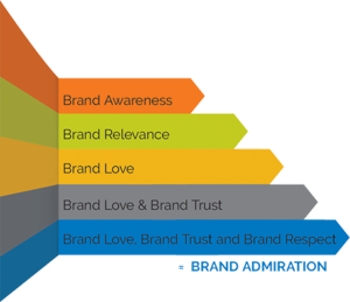You're hours away from taking the trip of a lifetime to Europe. French vineyards. Swiss mountains. Greek islands. You've saved up all your vacation time. You can't wait!
You're about to walk out the door, and your phone buzzes. It's a text message from the airline.
The plane that's supposed to take you away to paradise has been taken out of commission because of a mechanical issue (that's their fault!), and you can't leave until tomorrow.
How would you react in that scenario?
If you're like most of us, you'd lash out—demanding accountability from the airline and airing your grievances to anyone who would listen.
But one airline's flyers tend to respond very differently.
The Power of Trust, Love, and Respect
Unlike most of its competitors, Virgin America—which has finished atop the annual Airline Quality Ratings for four consecutive years—tends to catch less flak from customers when something goes wrong. Take, for instance, this recent exchange via Twitter:

If Spirit Airlines—which ranked last on the 2016 Airline Quality Ratings—had made the same mistake, how do you think its customers would have responded? (Hint: Check out #SpiritAirlines on Twitter.)
So, why the difference?
Two words: brand admiration—a new concept about to be introduced by marketing researchers C. Whan Park, Deborah J. MacInnis, and Andreas B. Eisingerich in their forthcoming book, Brand Admiration: Building a Business People Love.
At a high level, brand admiration can be defined as unconditional love for a company. That particular brand is part of who they are (think "Mac people") and what they stand for.
That kind of relationship between brand and brand admirer isn't accidental or the result of good fortune. Rather, according to the researchers, it hinges on a company's methodic and strategic commitment to developing three key pillars of brand admiration:
- Trust is achieved when a brand helps its admirers feel empowered, in-control, confident, or relieved of a particular pain point.
- Love is fostered when a brand stimulates senses of warmth, gratitude, nostalgia, and empathy.
- Respect is earned when a brand's beliefs, principles, hopes, and vision are in harmonious alignment with the people it serves.

Just how valuable are those pillars?
Done right, brand admiration begets extreme feelings of loyalty and advocacy among customers, partners, fans, and employees. When someone feels deep resonance with a brand, it becomes part of their sense of self. Over time, this level of admiration can yield enormous bottom-line benefits, the research by Park, MacInnis, and Eisingerich shows. Among those benefits:
- Valuable repeat-purchase patterns
- Unabashed public promotion of the brand
- Higher tolerance for mistakes and missteps
- Stronger talent acquisition and retention
- Improved employee morale
- Expanded alliance and partnership opportunities
Very simply: When companies have high brand admiration, they also experience explosive revenue growth and improved cost efficiencies, and far greater access to the very best talent and partnerships.
Is Your Brand Admired?
The concept of brand admiration is industry-agnostic.
Although the words "brand admiration" tend to evoke visions of B2C brands like Virgin, Apple, and Nike, the reality is that admiration is just as valuable to B2B businesses as it is to consumer brands. Just ask Costco, Salesforce, IBM, and Buffer—big and small B2B brands that invested heavily in developing brand admiration and have reaped the rewards of that strategy.
Now, here's the million (or billion) dollar question: Is brand admiration something your business is getting right? Or is it an area in need of serious improvement?
To answer those questions, you first need to ask and answer these three questions:
- Does my brand excite and inspire people?
- Do people feel gratified by my brand?
- Does my brand motivate them to do something great?
The good news: any business can cultivate relationships with its customers, partners, and employees that are deeply rooted in trust, love, and respect. Doing that, however, requires an understanding of who your stakeholders are, what they really need and value, and how your business can deliver those things in a way that's pleasing, fun, interesting, and emotionally satisfying.
In a subsequent series of articles, we'll help you better understand the pillars of brand admiration (with concrete examples from both B2B and B2C businesses) and create a plan to begin your quest toward brand utopia.
The goal is to explore examples of brand admiration in action and develop a framework for understanding how to develop brand admiration in three key areas: enablement, enticement, and enrichment.
Stay tuned!
If you'd like to learn more about brand admiration and the framework that Park, MacInnis, and Eisengerich have developed, check out their brand admiration website, full of helpful information and resources to help you assess your company's level of brand admiration.
Articles in this series:
- Brand Admiration: Why Some Brands Are Loved Unconditionally (and What You Can Learn From Them)
- Brand Admiration and the Power of Love: Build a Brand That People Adore
- Is Your Brand Trusted? Here's What Happens When It Is—and Isn't
- Brand Admiration and the Value of Respect: How to Build a Revered Brand
- Brand Admiration: Three Powerful Bottom-Line Benefits of Being Admired
- The Saving Grace of Brand Admiration: 3 Companies, 3 Mistakes, 3 Different Outcomes




